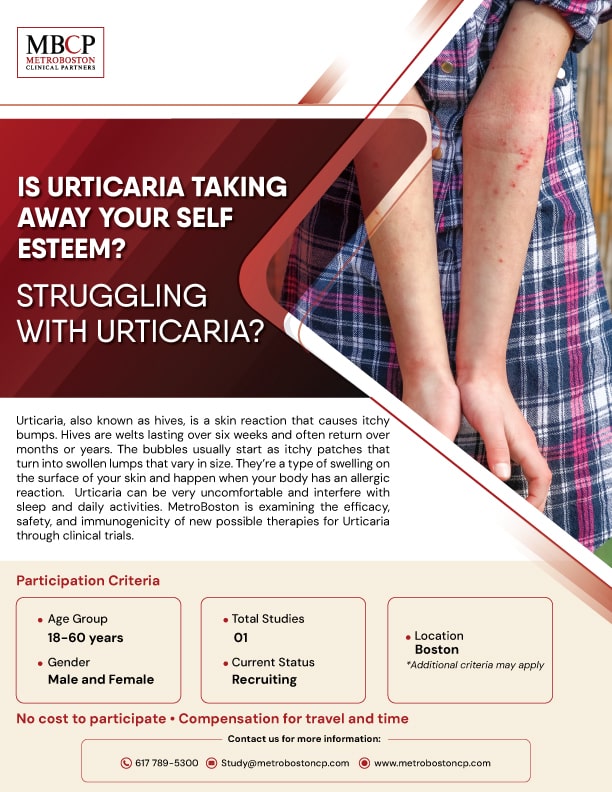Get relief from persistent itching and raised hives from effective treatment options for Chronic Urticaria/Hives – a condition causing skin irritation and discomfort. MetroBoston is conducting chronic spontaneous urticaria clinical trials to investigate potential drug treatments.
Chronic Spontaneous Urticaria Clinical Trials in Boston
Chronic Spontaneous Urticaria
Urticaria, also known as hives, is a skin condition characterized by itchy, raised, and red or white welts or bumps on the skin. These welts can range from dots to large patches and may appear anywhere on the body. Chronic spontaneous urticaria clinical trials aim to address this persistent condition. Urticaria can be acute or chronic. Acute urticaria can result from an allergic reaction to food, medications, insect bites, or other allergens. In contrast, chronic spontaneous urticaria is caused by autoimmune or idiopathic (unknown) factors.
In some cases, urticaria can be accompanied by angioedema, a condition characterized by swelling of the deeper layers of the skin and mucous membranes. MetroBoston is conducting Chronic spontaneous urticaria clinical trials in Boston to observe the safety and efficacy of new potential treatments that may help to improve the condition. Join our chronic urticaria clinical trials today and be part of the solution!
Enroll Now

Safety Efficacy,and Immunogenicity Evaluation
Eligibility Criteria
Enroll in Urticaria clinical trials in Boston and help us understand the complications of this condition.
Age Group
18-60 Years
Gender
Male and Female
Current Status
Recruiting
Total Studies
01
Location
Boston
Frequently Asked Questions
What is chronic spontaneous urticaria?
Chronic Spontaneous Urticaria (CSU),, is a skin condition characterized by the presence of recurrent hives (urticaria) that persisting for six weeks or longer. It is considered “spontaneous” because the hives appear and disappear without identifiable trigger.
How to treat chronic urticaria?
The treatment of chronic urticaria, aims to manage symptoms, reduce the frequency and intensity of hives, and improve overall quality of life. It’s important to consult with a healthcare professional, such as a dermatologist or allergist, to develop a tailored treatment plan.
What can I do to reduce my symptoms of chronic hives?
Here are some self-care measures you can try:
- Avoid triggers.
- Cool compresses.
- Wear loose-fitting clothing.
- Maintain a comfortable environment.
- Stress management.
- Moisturize the skin.
Will the study drug cure me of chronic hives?
Clinical trials for investigational drugs or treatments are conducted to assess their safety, efficacy, and potential benefits. The effectiveness of the study drug for Chronic Spontaneous Urticaria Clinical Trials would depend on various factors, including the underlying cause of the hives, and individual patient characteristics.
Will I have to pay to participate in the hives clinical trial?
No, participants will not have to pay to become a part of the study at MetroBoston.